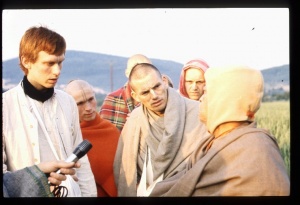CC Antya 1.136: Difference between revisions
m (1 revision(s)) |
No edit summary |
||
| Line 1: | Line 1: | ||
{{ | [[Category:Sri Caitanya-caritamrta - Antya-lila Chapter 01|C136]] | ||
<div style="float:left">'''[[Sri Caitanya-caritamrta|Śrī Caitanya-caritāmṛta]] - [[CC Antya|Antya-līlā]] - [[CC Antya 1|Chapter 1: Śrīla Rūpa Gosvāmī's Second Meeting With the Lord]]'''</div> | |||
<div style="float:right">[[File:Go-previous.png|link=CC Antya 1.135|Antya-līlā 1.135]] '''[[CC Antya 1.135|Antya-līlā 1.135]] - [[CC Antya 1.137|Antya-līlā 1.137]]''' [[File:Go-next.png|link=CC Antya 1.137|Antya-līlā 1.137]]</div> | |||
{{CompareVersions|CC|Antya 1.136|CC 1975|CC 1996}} | |||
{{RandomImage}} | |||
==== TEXT 136 ==== | ==== TEXT 136 ==== | ||
<div class="verse"> | |||
<div | :so ‘yaṁ vasanta-samayaḥ samiyāya yasmin | ||
so ‘yaṁ vasanta-samayaḥ samiyāya yasmin | :pūrṇaṁ tam īśvaram upoḍha-navānurāgam | ||
pūrṇaṁ tam īśvaram upoḍha-navānurāgam | :gūḍha-grahā rucirayā saha rādhayāsau | ||
gūḍha-grahā rucirayā saha rādhayāsau | :raṅgāya saṅgamayitā niśi paurṇamāsī | ||
raṅgāya saṅgamayitā niśi paurṇamāsī | |||
</div> | </div> | ||
| Line 15: | Line 18: | ||
==== SYNONYMS ==== | ==== SYNONYMS ==== | ||
<div class="synonyms"> | |||
<div | ''saḥ''—that; ''ayam''—this; ''vasanta-samayaḥ''—springtime; ''samiyāya''—had arrived; ''yasmin''—in which; ''pūrṇam''—the complete; ''tam''—Him; ''īśvaram''—the Supreme Personality of Godhead; ''upoḍha''—obtained; ''nava-anurāgam''—new attachment; ''gūḍha-grahā''—which covered the stars; ''rucirayā''—very beautiful; ''saha''—with; ''rādhayā''—Śrīmatī Rādhārāṇī; ''asau''—that full-moon night; ''raṅgāya''—for increasing the beauty; ''saṅgamayitā''—caused to meet; ''niśi''—at night; ''paurṇamāsī''—the full-moon night. | ||
</div> | </div> | ||
| Line 23: | Line 25: | ||
==== TRANSLATION ==== | ==== TRANSLATION ==== | ||
<div class="translation"> | |||
<div | " 'Springtime had arrived, and the full moon of that season inspired the Supreme Personality of Godhead, who is complete in everything, with new attraction to meet the beautiful Śrīmatī Rādhārāṇī at night to increase the beauty of Their pastimes.' " | ||
</div> | </div> | ||
==== PURPORT ==== | ==== PURPORT ==== | ||
<div class="purport"> | |||
Śrīla Bhaktivinoda Ṭhākura interprets this verse (''Vidagdha-mādhava'' 1.10) in two ways, for Lord Kṛṣṇa and for Śrīmatī Rādhārāṇī. When interpreted for Kṛṣṇa, the night is understood to have been a dark-moon night, and when interpreted for Śrīmatī Rādhārāṇī, it is considered to have been a full-moon night. | |||
</div> | |||
<div | <div style="float:right; clear:both;">[[File:Go-previous.png|link=CC Antya 1.135|Antya-līlā 1.135]] '''[[CC Antya 1.135|Antya-līlā 1.135]] - [[CC Antya 1.137|Antya-līlā 1.137]]''' [[File:Go-next.png|link=CC Antya 1.137|Antya-līlā 1.137]]</div> | ||
__NOTOC__ | |||
</div> | __NOEDITSECTION__ | ||
__NOTOC__ | |||
Revision as of 09:50, 11 September 2021

A.C. Bhaktivedanta Swami Prabhupada
TEXT 136
- so ‘yaṁ vasanta-samayaḥ samiyāya yasmin
- pūrṇaṁ tam īśvaram upoḍha-navānurāgam
- gūḍha-grahā rucirayā saha rādhayāsau
- raṅgāya saṅgamayitā niśi paurṇamāsī
SYNONYMS
saḥ—that; ayam—this; vasanta-samayaḥ—springtime; samiyāya—had arrived; yasmin—in which; pūrṇam—the complete; tam—Him; īśvaram—the Supreme Personality of Godhead; upoḍha—obtained; nava-anurāgam—new attachment; gūḍha-grahā—which covered the stars; rucirayā—very beautiful; saha—with; rādhayā—Śrīmatī Rādhārāṇī; asau—that full-moon night; raṅgāya—for increasing the beauty; saṅgamayitā—caused to meet; niśi—at night; paurṇamāsī—the full-moon night.
TRANSLATION
" 'Springtime had arrived, and the full moon of that season inspired the Supreme Personality of Godhead, who is complete in everything, with new attraction to meet the beautiful Śrīmatī Rādhārāṇī at night to increase the beauty of Their pastimes.' "
PURPORT
Śrīla Bhaktivinoda Ṭhākura interprets this verse (Vidagdha-mādhava 1.10) in two ways, for Lord Kṛṣṇa and for Śrīmatī Rādhārāṇī. When interpreted for Kṛṣṇa, the night is understood to have been a dark-moon night, and when interpreted for Śrīmatī Rādhārāṇī, it is considered to have been a full-moon night.